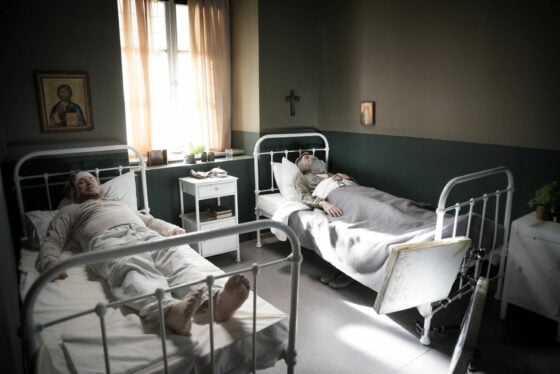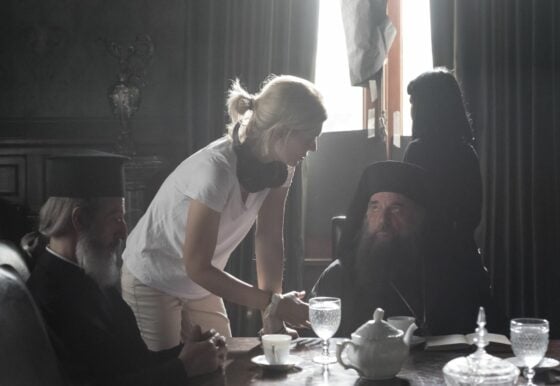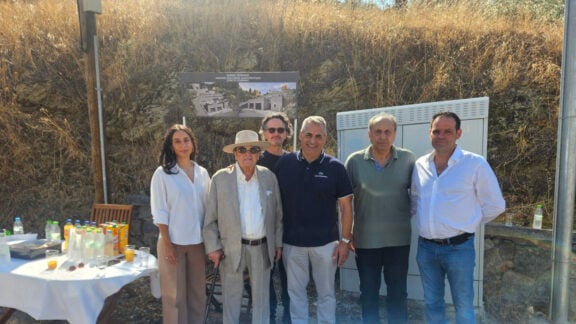Which book were you reading that drew you to the story of St Nektatrios? Had you known much about him before reding the book?
In 2012, while in Belgrade, I bought a book about St. Nektarios. It was called “St. Nektarios of Aegina – Earthly Angel Heavenly Man”. I heard of him before and that is why I wanted to read about him.
What drew you to telling the story of St Nektarios? How did you go about preparing for the film?
When I read his story I was very moved and I got a very strong impulse to make a film. I did a lot of reading and research. I listened to various talks about him. I had an outline of a screenplay within a year. When I went to Aegina to visit his monastery for the first time in 2013 I took the outline with me and I asked St. Nektarios to help me make a film, if it is God’s will. In summer of 2014 I went to Aegina again, this time with a screenplay. I did the same thing in 2015.
What developments in the process helped bring the project to life?
Because of some family issues my husband and I decided to relocate to Serbia and then Greece in June of 2016. Once in Greece, I felt that maybe it was a good time to try and make the film about St. Nektarios. As I embarked on putting pieces together as I did before with other projects in the US, the doors started to open.
How long was it from conception to production?
It took five years while in Greece to complete the film. From the conception until completion it took almost 10 years.
How was your idea to make this film received initially? How were you able to convince people that the project was a viable one?
I had such an inspiration and an urge to make a film about Saint Nektarios that it must have compelled people to trust me. I was fortunate that many people came on board because of their love for the Saint. In my experience, in the film industry it is never clear which film or story will make a good movie and become a commercial success. There are so many elements that this depends upon. In general, every dream from a conception is doubted by everyone and everything and if turns into reality and becomes a success then everyone has an explanation for it. This film was made to help people and to give people courage and hope, so I am glad it happened. I also hope my personal story will help people to stick to their dreams and not give up.
What difficulties did you face as the film’s writer, one of the producers and the director? Was it easier wearing all these many hats or another complication in the process?
I have written a few scripts before Man of God and I must admit that writing is something that I really love and enjoy doing. It is a detailed process and it takes time but it feels good at the same time. Directing is much more strenuous. I decided to direct Man of God because I felt very connected to the story on a very personal level. I come from a theatre background and I love working with the actors. I can say that I’m an actor’s director. The producing part is gut wrenching and soul killing so when we add it all up it was not easy, but with God’s help and the help of Saint Nektarios it all went well.
Were there difficulties to overcome as a woman driving a project such as this?
I never felt inferior being a woman. What I mean to say is that if someone were to harbour an animosity towards me because of me being a woman I probably wouldn’t even notice.
READ MORE: St Nektarios movie breaks recent box office records in Greece and Cyprus
The film crew appears to consist mainly of Greek acting and technical crew. How difficult was it to communicate and also to ensure that the film is convincing in an English-language medium?
The actors spoke English very well. The accents were essential for this film. To make this movie to be truthful, it had to be done either in Greek or in English with the accents. Apart from that, the language of art is universal. I was very lucky to work with so many talented Greek actors, director of photography, costume and set designer, the editor and all the crew members.

How well did Mickey Rourke and Alexander Petrov fit in to the process?
Choosing actors is one of the most important things in directing. I was very detailed and picky in that process. Every actor was right for the role and so were Mickey Rourke and Sasha Petrov. I had Mickey Rourke in mind for a long time for the role of the Paralyzed Man. He had all the right ingredients for it. He is a great actor with a lot of heart and has an affinity for Saints and suffering. After a while I was able to get hold of his manager and send him the script and he agreed to do the part. I am very happy and honoured to have worked with him. Sasha Petrov is also a great actor. We worked very well together.
How difficult was it to film under COVID protocols?
We filmed under COVID restrictions and sure it added extra obstacles to the ones that already exist in independent film making. We strictly followed all the guidelines and regulations and, truly and miraculously not one person on the set contracted COVID-19 while shooting. I must say that for our film, extra difficulty has helped to portray more truthfully a very difficult life of the Saint. As we are all still going through a lot of difficulties I believe that this film will help many. One of the comments made in Serbia by a Parliament member after watching “Man of God” was this: “After watching this movie I believe that every difficulty you may encounter will be easier to handle.”
In a largely secular world, was it not a big risk to commit to a film project on a saint’s life, particularly an Orthodox one? What do you think the audiences will get out of this film?
I never thought of making a film about a saint before I read a story of Saint Nektarios. It was his life story that moved me to make a film. It is a great story that anyone regardless of their religious or ethnic background could relate to. Stories that inspire and give hope are great subject for films. I think more than ever the secular world needs and craves those kinds of stories. To prove my point, I will point out to something: I heard many times, even from people that supported the film, that mainly church ladies with their grandchildren will go to see a film about Saint Nektarios. The shock came when young people, who are not even religious, ended up seeing it in large numbers. Some saw it even multiple times. I was very happy to see that, but I wasn’t surprised. I was saying before the film came out that I made this film for everyone, especially for young people and those who are not religious. I hope “Man of God” will continue to inspire and move people around the world.
It has been released in Greece and Cyprus where it is doing very well. How well was it received in Russia where it played at the Moscow International Film Festival?
The film premiered at Moscow Film Festival where it won the audience award for best film. After that the film was shown in Los Angeles. It was Los Angeles premiere. The festival in Los Angles was an online event due to pandemic and the tickets were sold out in matter of minutes. We won the audience award for best picture as well.
The film is doing well both in Serbia and Russia. We are currently working on theatrical release for the US and Canada. The film will also come out theatrically in Australia, Latin America, France and Italy. The exact release dates haven’t been set but the film will be released in the first quarter of 2022 in those territories.
READ MORE: Sneak peek at ‘Man of God’: movie about St Nektarios filmed in Greece
What standing would you say St Nektarios have in the Serbian Orthodox church and the Russian?
Saint Nektarios is a very well-known saint in both Russia and Serbia. I’m Serbian and I go to Serbia quite often. I haven’t been to one Church in Serbia that did not have an icon of Saint Nektarios.

Why was St Nektarios the subject of so much bile after his time in Alexandria? Why was he considered such a threat by the hierarchies of the time?
Saint Nektarios was a righteous man who lived by what he preached and was loved and respected by people, both by Greek Orthodox Christians and Arab Muslims. In the high circles of society and church institutions people sometimes suffer from lust for money and power; and if someone differs he sticks out as a sore thumb and becomes a stumbling block. Saint Nektarios was also loved by the Patriarch of Alexandria who was quite old and he was the most favourite one to become the next Patriarch. Some of those around the Patriarch of Alexandria had to make sure that Saint Nektarios did not become the next Patriarch.
Do you cover the whole story of the saint’s life or do you focus on a particular part of his life and why?
I focused on His life from the time he was exiled from Egypt until the very end of his life. This period of his life is constantly ridden by obstacles and unjust prosecution which not only gives way for good drama but also supports one of the main premises of the story – greed and an unhealthy desire for power destroys souls and causes problems for humanity.

About Yelena Popovic
Born in Serbia, Yelena Popovic was 15 when she won “the Look of the Year” competition, in Belgrade. This opened the door to a modelling career that took her to Milan. She was 18 when she moved to New York when she was 18 years old.
By the age of 22 she turned her talents to screenwriting. Through modelling, she met many people who were in the US entertainment industry and who have proved helpful to her once she turned her back on modelling and delved deeper into the many facets of film making.
She had an acting role in the 2000 film “Cast Away”, starring Tom Hanks. She also has acted in the film “13.jul” a film based on an uprising in Montenegro following the capitulation of the Yugoslav army during the Second World War.
In 2008, with her husband, Alexandros Potter, she co-founded Simeon Entertainment with the aim “of developing, producing, and distributing powerful independent feature films across multiple genres that focus on a strong narrative, entertain and support good values”.
The company financed, produced, and distributed the 2013 NYIIFVF Audience Award Winner, “L.A. Superheroes”. The film was based on Ms Popovic’s experiences in the US. She wrote the script, acted and directed the film.









